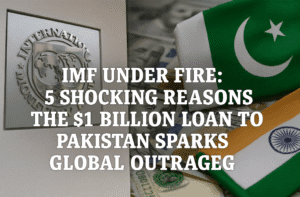IMF Under Fire: 5 Shocking Reasons the $1 Billion Loan to Pakistan Sparks Global Outrage
The IMF faces intense criticism for approving a $1 billion loan to Pakistan days after a terrorist attack in Indian-administered Kashmir, amid escalating India-Pakistan tensions. India abstained from the IMF vote, condemning the lack of safeguards to prevent funds from potentially financing cross-border terrorism or military activities. Critics argue the timing undermines regional stability, emboldens Pakistan’s military establishment, and ignores Islamabad’s history of relying on 28 IMF bailouts over 35 years without meaningful economic reforms.
Analysts and regional leaders, including Jammu & Kashmir’s Chief Minister, question how such aid promotes de-escalation, citing concerns over “fungible” funds indirectly supporting aggression. Former Afghan MP Mariam Solaimankhil accused the IMF of “bankrolling bloodshed,” reflecting broader distrust of Pakistan’s priorities. The controversy highlights the ethical dilemma faced by multilateral institutions in balancing financial assistance with geopolitical accountability, urging reforms to address lending in conflict-prone regions.

IMF Under Fire: 5 Shocking Reasons the $1 Billion Loan to Pakistan Sparks Global Outrage
The International Monetary Fund (IMF) has drawn sharp criticism for approving a $1 billion loan disbursement to Pakistan under its Extended Fund Facility (EFF), bringing total aid under this program to $2.1 billion. The decision, announced days after a deadly terrorist attack in Kashmir’s Pahalgam and amid escalating India-Pakistan hostilities, has sparked concerns about the timing and potential consequences of the funding.
India’s Opposition and IMF Protocol
India abstained from voting at the IMF Executive Board meeting, signaling its dissent within the constraints of IMF rules, which do not allow member countries to vote “no.” Instead, nations can only approve or abstain. India’s Finance Ministry criticized the lack of “moral safeguards” in IMF processes, warning that funds could be diverted to support cross-border terrorism or military activities. The objection highlighted broader unease among some IMF members about accountability in lending to nations with geopolitical conflicts.
Critics Question IMF’s Timing and Priorities
The loan’s approval during heightened India-Pakistan tensions has been labeled tone-deaf by analysts and officials. Former Indian Foreign Secretary Kanwal Sibal called the decision a failure of optics, emphasizing the IMF’s perceived bias toward Western geopolitical interests. Experts argue the move undermines efforts to hold Pakistan accountable for terrorism, with Jammu & Kashmir’s Chief Minister Omar Abdullah questioning how financial aid promotes regional de-escalation.
Pakistan’s History of IMF Reliance
Pakistan’s economy has relied heavily on IMF bailouts, with 28 programs over 35 years, including four in the past five years. Critics note a pattern of minimal structural reform and persistent instability, suggesting the latest loan risks enabling Pakistan’s military establishment rather than fostering economic resilience. The simultaneous approval of $1.4 billion under the Resilience and Sustainability Facility (RSF) for climate-related challenges has also faced scrutiny, with skeptics doubting the funds’ intended use.
Regional and Global Voices Condemn Decision
The backlash extends beyond India. Former Afghan MP Mariam Solaimankhil accused the IMF of “bankrolling bloodshed,” referencing Pakistan’s alleged support for militant groups. Analysts like Sushant Sareen argue the loan empowers Pakistan’s military, not its civilian institutions, perpetuating a cycle of dependency without accountability.
Broader Implications
The controversy underscores the challenges multilateral institutions face in balancing economic assistance with geopolitical realities. While the IMF’s mandate focuses on financial stability, critics stress the need for greater due diligence to prevent funds from exacerbating regional conflicts. The debate raises questions about reforming global governance frameworks to address such dilemmas in an increasingly polarized world.
In summary, the IMF’s decision highlights the complex interplay between economic aid and geopolitical strife, with critics urging a more nuanced approach to lending in conflict-prone regions.
You must be logged in to post a comment.